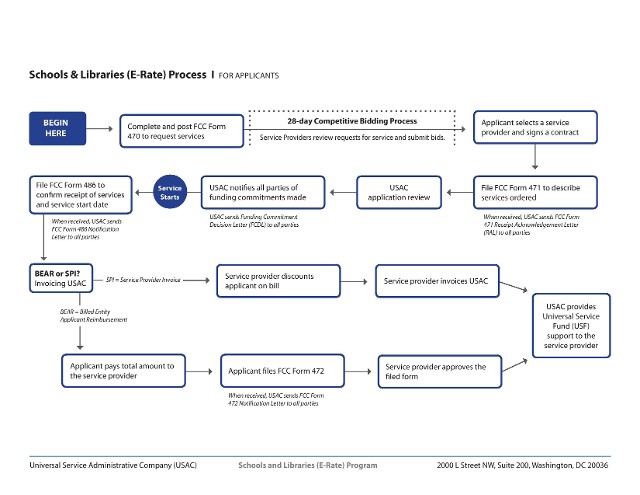Update: The Federal Communications Commission (FCC) adopted the E-rate Modernization Order on July 11, 2014. The Order takes major steps to modernize and streamline the E-rate program and focuses on expanding funding for Wi-Fi networks in eligible elementary and secondary schools and libraries across America.
Universal service is the principle that all Americans should have access to a baseline level of telecommunications services. This principle is the cornerstone of the Communications Act of 1934, which established universal service in legislation and also created the Federal Communications Commission (FCC). Since that time, universal service policies have helped make telephone service widely available throughout the U.S., even in rural areas. The Telecommunications Act of 1996 (1996 Telecom Act) expanded the scope of universal service to include increased, affordable access to both telecommunications and advanced services, such as high-speed Internet, for all consumers.
More specifically, the law adopted explicit goals to guide the implementation of universal service policies. These goals include:
- Promote the availability of quality services at just, reasonable, and affordable rates.
- Increase access to advanced telecommunications services throughout the nation.
- Advance the availability of such services to all consumers, including those with a low income and those who live in rural, insular, and high cost areas, at rates that are reasonably comparable to those charged in urban areas.
- Increase access to telecommunications and advanced services in schools, libraries, and rural health care facilities.
- Provide equitable and non-discriminatory contributions from all providers of telecommunications services to the fund supporting universal service programs.
To implement the 1996 Telecom Act, the FCC established four programs:
- High Cost, for rural areas (transitioning into the Connect America Fund)
- Lifeline (for low-income consumers), including initiatives to expand phone service for Native Americans
- Rural Health Care
- Schools and Libraries (commonly referred to as "E-rate")
Money to pay for universal service programs comes from the universal service fund (USF). The USF is paid for by contributions from telecommunications carriers, including wireline and wireless companies, and interconnected Voice over Internet Protocol providers, including cable companies that provide voice service, based on an assessment of their interstate and international end-user revenues.
The FCC is reforming universal service policies to encourage further investment in and access to evolving broadband and voice services, promote expansion and adoption of broadband services, and improve efficiencies and eliminate waste in the programs.
-- "Universal Service", About USAC, 1997-2013
E-Release: USAC is rolling out the first phase of its new IT system, named E-rate Productivity Center (EPC) and pronounced "epic."
The Application Process:

The Universal Service Fund, more commonly known as E-rate, provides DISCOUNTS TO ASSIST MOST SCHOOLS (K12, public or private) AND LIBRARIES obtain affordable telecommunications and Internet access. These discounts are available to individual schools/libraries, or services can be consolidated through a single entity for even greater savings.

